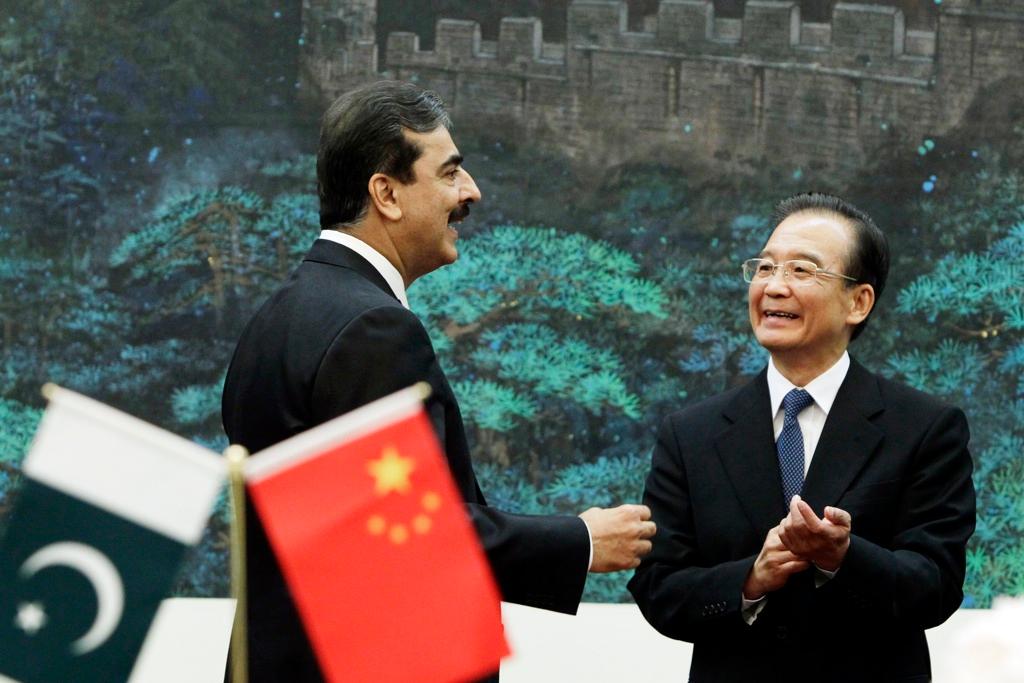Pitting US against China, Pakistan hits its diplomatic stride
Pakistan’s Prime Minister Yusuf Raza Gilani talks to China’s Premier Wen Jiabao during a singing ceremony at the Great Hall of the People in Beijing on May 18, 2011.
ISLAMABAD, Pakistan — Pakistan, it seems, is developing a diplomatic swagger as it gainfully plays the world’s two biggest powers, China and the United States, off each other.
In the most recent example, Washington bristled over suspicions that Pakistan shared with China the American stealth chopper that crashed outside the hideout of Osama bin Laden in May, handing over advanced technology the United States hoped to keep for itself.
But is it the technology the United States is worried about? Or is it that Pakistan yet again snubbed Washington in favor of Beijing?
Pakistan has a history of fencing with China’s support when the United States imposes sanctions or aid cuts on the country. And China, for its part, often happily reciprocates.
GlobalPost in Beijing: It's no surprise that Pakistan gave China a peek at U.S. chopper
A day after the brazen U.S. mission that killed bin Laden on Pakistani soil on May 2, a mission officials say was conducted without the knowledge of Pakistan, China came to the defense of the embarrassed Pakistani military.
“The Pakistani government's determination to fight terrorism is staunch and its actions have been vigorous. Pakistan has made important contributions to the international struggle against terror,” China’s Foreign Ministry spokeswoman, Jiang Yu, said.
And when in 1990 the U.S. blocked the delivery of F-16 fighter jets to punish Pakistan for its development of nuclear weapons, China made up the difference, developing the JF-17 Thunder jointly with Pakistan. The first squadron of JF-17 Thunders has now been inducted in the Pakistan air force.
Pakistan did end up receiving some of those F-16s, but Ahmad Mukhtar, the country’s defense minister, now says it can’t afford to buy more and that, anyway, China’s come with commercial benefits.
More recently, when in July the United States announced it would cut $800 million in military aid to Pakistan, China again stepped in, pledging continued support for its neighbor.
GlobalPost in New Delhi: Will the US lose Pakistan to China
“In this scenario Pakistan says okay U.S.A., if you don’t want to support us we have the People’s Republic. It is a diplomatic tactic. It is trying to pressure the U.S. to a level where it accepts a relationship on Pakistan’s terms,” he said.
Ayesha Siddiqa, a defense analyst, agreed.
“Pakistan would use China to entice the U.S. more and say that look, you cannot blackmail us because we have this other relationship too. But I think Pakistani policy makers say it’s either or. They would happily go for China if China is willing to meet all its needs, like providing grants to fill the economic gap, which wouldn’t be there if the U.S. leaves,” she said. “But China is not entirely willing to do that.”
Pakistani policymakers would be foolish to think that China can ever replace the United States in Pakistan, said Hassan Askari Rizvi, a Pakistani analyst, pointing to America’s influence over global financial institutions.
“China will not be able to replace the U.S. when it comes to IMF and the World Bank” he said. “And if those don’t give you aid then a lot of western countries won’t give you aid. And Pakistan’s economic problems are so huge that it can’t simply rely on China to solve their economic problems.”
Ties with the United States are also important to Pakistan’s economy beyond financial aid packages and loans. The United States is the biggest market for Pakistani, accounting for more than 17 percent of Pakistan’s total exports, according to the International Monetary Fund. Representing barely 8 percent of Pakistan’s export market, China has yet to prove itself an as profitable alternative.
Islamabad’s strategy of pressuring the United States is based on the notion that the Americans cannot win in Afghanistan nor withdraw from it without Pakistan’s help, Khan said. But it’s a risky strategy, he added.
GlobalPost in Islamabad: Pakistan's mangoes sweeten relations with US
“To what extent Pakistan is correct is the question. To what extent does the U.S. accept pressure from Pakistan? If there is a miscalculation, ties between the two countries can really be broken.”
Relations between Pakistan and the United States have already hit rock bottom. Pakistan recently informed U.S. Embassy officials they couldn’t leave Islamabad without permission, and American specials forces trainers left the country. Not to mention the continuous expressions of distrust over each other’s conduct.
It is not just the rocky relationship or the prospect of pressuring the United States to submit to the terms and conditions of its partner in the war on terror that leads Pakistan to woo China, analysts say. Many here fear that the United States will abandon them once it leaves Afghanistan, and are simply looking for a suitable replacement.
“We still don’t know if it is going to end in two years time or five years time,” said Defense Minister Mukhtar, referring to the military assistance.
And so Pakistan looks east.
“We have to survive. We have to look for the right country that can help us and at this moment the Chinese have helped us wherever we wanted help,” said Mukhtar, referring to Chinese help in developing nuclear plants. “No other country wanted to give us what we got from the Chinese.”
Every day, reporters and producers at The World are hard at work bringing you human-centered news from across the globe. But we can’t do it without you. We need your support to ensure we can continue this work for another year.
Make a gift today, and you’ll help us unlock a matching gift of $67,000!
